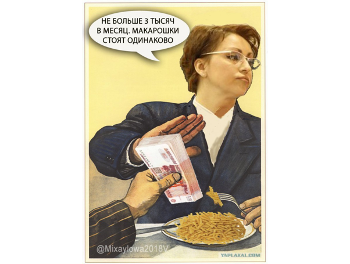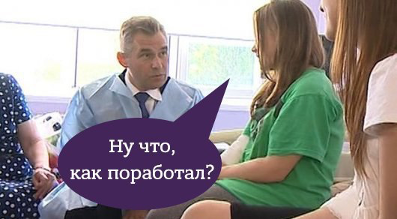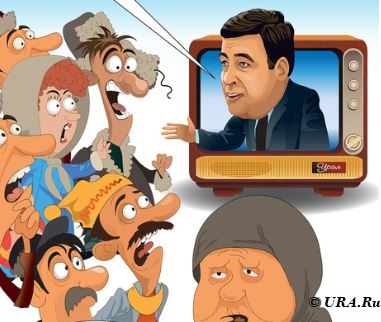Public Relations Failures by Russian State Officials: A Botched Cultural Transmission?
In 2018, during a public meeting, Olga Glatskikh, head of the Sverdlovsk Region Youth Politics Department, gave the following response to a question about the lack of state funding for youth projects: “The state owes nothing to you in principle. Your parents who gave birth to you owe you things. The state did not ask for you to be born.” [1] This episode which resulted in Glatskikh’s widespread condemnation and temporary suspension is just one example on a long list of insensitive statements by Russian state officials that have provoked lasting public outrage. Other notable cases included Minster of Labour, Natalia Sokolova’s assertion that one can easily survive on a $56 per month subsistence wage by eating a “balanced” and “slimming” diet of macaroni and seasonal vegetables [2], Prime Minister Dmitrii Medvedev’s suggestion that teachers should have become businessmen “if they wanted to earn money,” [3] and Children’s Rights Commissioner Pavel Astakhov’s tone-deaf question to survivors of a 2016 canoe accident in Karelia, which claimed the lives of 13 children: “So, how was the swim?” [4] One interesting thing about these statements is how starkly they contrast with the rhetorical style of President Vladimir Putin as well as official state policies of raising birth rates by subsidizing families with children and incentivizing young people to become teachers by promising them higher salaries. From the evolutionary perspective on cultural transmission which predicts selective learning from and imitation of behaviors of “successful” individuals (Atkisson et al. 2012; Henrich and Gill-White 2001; Henrich 2015), such public remarks by Russian state officials that often cost them their careers appear puzzling: after all, why would they not just copy the style of their leader and reproduce the official line of the ruling United Russia Party?

“No more than 3,000 [rubles] per month. Macaroni price is always the same.”
A meme featuring Natalia Sokolova. Source: yaplakal.com
While the withdrawal of state support from multiple sectors of the Russian economy has been a de facto policy for the past 30 years, President Putin has never blanketly endorsed neoliberalism and instead goes to great lengths to portray himself as a caring, compassionate leader. To protect his approval ratings, Putin often distances himself from unpopular social policies and blames their disastrous outcomes on the corruption and incompetence of regional heads and mid-level state officials – a political strategy popularly known as “Good Tsar, Bad Boyars.” This strategy does not mean, however, that the President’s government benefits from controversial statements by officials that generate resentment and further exacerbate existing social tensions. The forced resignation of disgraced officials and recently proposed amendments to the “insulting speech” law that envision fines for state representatives who offend citizens speak to efforts to curtail the embarrassing incidents.
While such sanctions might push some state officials to avoid direct insults, I predict that they will have little impact on their overall communicative strategies because the structural position of officials as “bad boyars” virtually precludes them from successfully imitating the president’s rhetorical style. Popularly blamed for most social problems, when asked to comment on them, mid-level state officials hardly see it as an opportunity for self-promotion via public displays of compassion. Instead, they feel attacked and choose to go on the defensive by invoking the neoliberal discourses of “individual responsibility” as a justification for existing problems. Pensioners, teachers, and doctors are struggling to put food on the table? They should have chosen more lucrative professions! State inspectors failed to shut down a summer camp that routinely sent children on unsafe canoe trips? Perhaps the children themselves should have known better than to “go for a swim.” Although they often fail to predict the public’s reaction to their statements, these officials clearly do care about their public image. In fact, their provocative statements can be seen as an attempt to defend it by shifting blame from the institutions they represent, but do not fully control, to individual citizens. As they fear the wrath of their superiors significantly more than the Russian public, officials cannot point fingers back at the inadequate funding or oversight by the federal government. Nor can they acknowledge the validity of average people’s grievances, as in this context it would be tantamount to an admission of personal guilt.

“So, how did your job go?”. A meme created following Astakhov’s forced resignation that reverses the roles and has the survivors ask the former Children’s Rights Commissioner. Source: pikabu.ru.
A similar analysis can be applied to the patterns of diffusion of populist discourses that enable political actors to make a claim of representing “the people” by channelling popular discontent and scorning elites. Many political commentators have long held that the major danger of “fringe populist movements” lies in their capacity to influence mainstream political discourse, as established parties adopt parts of their agendas to avoid losing voters (Camu 2011; Curran 2004; Mazzoleni 2008; Van Spanje 2010). Yet, the diffusion of populist tropes has not been as widespread as predicted. While clearly successful with aggrieved constituencies, it is difficult for political actors who have been part of the establishment for decades to faithfully employ this rhetorical strategy. As a result, their options for responding to populist challenges are rather limited: they can either attempt to defend the status quo and refuse to acknowledge the often legitimate grievances underlying populist agendas (as was the case with Hillary Clinton’s infamous “basket of deplorables” comment and her declaration that “America is already great”) or they can try to adopt modified versions of populist discourses that acknowledge social problems, but place blame on “external” forces – transnational governing bodies (EU, UN, OECD, etc.), foreign governments, or groups perceived to act on behalf of these forces (dissident intellectuals, NGOs, immigrants, infiltrators, etc.). Contrary to the persistent stereotype of politicians as incorrigible demagogues or opportunists eager to say whatever will please their voters, in reality, the structural position of long-term officeholders in precarious economies substantially limits their capacity to engage with critical discourses. From this perspective, the PR failures of Russian politicians and leaders in many other countries often ascribed to an individual inability to absorb changing cultural norms or understand public expectations, may in fact reflect the strategic choice to stick to tropes that exculpate the interest groups they represent.
References
Atkisson, Curtis, Michael J. O’Brien, and Alex Mesoudi. 2012. “Adult Learners in a Novel Environment Use Prestige-Biased Social Learning.” Evolutionary Psychology 10(3): 519-37.
Campbell, Bradley and Jason Manning. 2018. The Rise of Victimhood Culture. Microaggressions, Safe Spaces, and the New Culture Wars. New York: Palgrave Macmillan.
Camus, Jean-Yves. 2011. “The Extreme Right in France: Redrawing the Map to Be Expected.” Pp. 83-99 in Is Europe on the ‘Right’ Path? Right-Wing Extremism and Right-Wing Populism in Europe edited by N. Langenberger and B. Schellenberg. Berlin: Friedrich Ebert Stiftung.
Curran, Giorel. 2004. “Mainstreaming Populist Discourse: The Race-Conscious Legacy of Neo-Populist Parties in Australia and Italy.” Patterns of Prejudice 38(1): 37-55.
Henrich, Joseph and Francisco J. Gil-White. 2001. “The Evolution of Prestige: Freely Conferred Deference as a Mechanism for Enhancing the Benefits of Cultural Transmission.” Evolution and Human Behavior 22(3): 165-196.
Henrich, Joseph. 2015. The Secret of Our Success: How Culture is Driving Human Evolution, Domesticating Our Species, and Making Us Smarter. Princeton, NJ: Princeton University Press.
Littler, Jo. 2008. ““I Feel Your Pain”: Cosmopolitan Charity and the Public Fashioning of the Celebrity Soul.” Social Semiotics 18(2): 237-251.
Mazzoleni, Gianpietro. 2008. “Populism and the Media.” Pp. 49-66 in Twenty-First Century Populism: The Spectre of Western European Democracy edited by D. Albertazzi and D. McDonnell. Basingstoke: Palgrave Macmillan.
Renninger, Bryce. 2018. ““ARE YOU A FEMINIST ?” Celebrity, Publicity, and the Making of a PR-Friendly Feminism. Emergent Feminisms.” Pp. 42-56 in Complicating a Postfeminist Media Culture edited by J. Keller and M. E. Ryan. New York: Routledge.
Van Spanje, Joost. 2010. “Contagious Parties: Anti-Immigration Parties and Their Impact on Other Parties’ Stances on Immigration in Contemporary Western Europe. Party Politics 16(5): 563–586.
[3] “Don't Teach if You Want to Make Money, Says Medvedev.” The Moscow Times, August 4, 2016.




Radu Umbres 16 July 2020 (20:07)
Passing the buck, now and in the past
Thanks Victoria for this foray into Russian political discourse, one which is unsurprinsingly similar to Romanian voices. I am quite persuaded by your arguments, and I would like to suggest a couple ideas in the same direction.
One is the continuity between the present and the socialist time. Then, we also had a top-level discourse emphasising the protective and nurturing role of the state (and of the Party). However, the collectivist ideology was changed to a different kind of advice for the wider population. Communism brought prosperity, but citizens had to tighten their belts, centralised management was perfect but workers had to perform heroic deeds, Communist societies were happier than those in the West but one had to be alert for traitors and critics. It makes one think of Orwell's doublespeak, but for pragmatic reasons, as you suggest. Idealised prosperity could only be achieved by lowering expectations, management was often disastrous and exploitation of workers drove productivity, and people were not really that happy living in Soviet Russia or Romania. One could not say these things as coming from the Party, the President or the Head Secretary of the Party, but those dealing directly with the reality of communism needed to push unpopular measures and guard against defection. Since communism could not be criticised, one had to find scapegoats in individual cases or imperfect human nature.
The Good Tsar versus the Bad Boyar trope has a Romanian correspondent, a folk saying that "until you reach God, the saints will eat you up". One could perceive the same image, a separation between the ultimate power living somewhere beyond the reach of mortals (or petty citizens) and its agents on the ground getting their hands dirty with implementation of policy/vision, both chanelling divine will and blocking direct access to it. I think the source of such representations are social systems based on patronage and personalised power, traceable back to feudalism or beyond and surviving in various forms until the present. We could thus envisage a different discourse at each level of power. The Tsar berating the court boyars, the court boyars berating the countryside ones, the countryside boyars berating the peasants/muzhiks. Each segment passes on responsibility to the level below, but never up (since it is costly to accuse superiors of mismanagement or malevolence). However, the top dog is also the one entity which ideologically connects all networks of personalised patronage, an impersonation of the social contract holding the entire society together. This entity cannot be contested nor does it assume a direct effect upon society, so the intermediary actors have to fend off for themselves.
Victoria Fomina 17 July 2020 (06:41)
Thank you for this comment, Radu. I find your analogy with the ultimate benevolent power that gets corrupted in the process of mediation very insightful. I fully agree with your remarks on patronage – given the stratified nature of power groups, there is bound to be some variation in discourses across different levels. In the context of modern nation-states, the classic feudal model of berating one’s immediate subordinates undergoes an interesting modification. It is no longer the top political leaders who are completely shielded from criticism from any group, but rather the generalized category of “the people.” In Imperial Russia, the patronizing denouncement of peasants as lazy, uncultured, and prone to drunk debauches and criminality was common across the entire vertical of power, including the aristocracy and top officialdom. Yet, in the Soviet Union such a discourse was no longer thinkable. The Soviet people were represented as brave, selfless, conscientious, and hard working, while all the social ills were blamed on saboteurs and “enemies of the people.” Alcoholism and recklessness were condemned, but also viewed as social problems rather than vices inherent to a specific group. Likewise, the nationalist discourses promoted by President Putin’s government rely on the image of great and virtuous Russian people. This creates a dilemma for the local state officials who find themselves unable to either criticize their superiors or openly scold the citizens demanding state support. In this context, the discourse of individual responsibility emerges as a halfway solution. While an offensive image of a lazy person who lacks entrepreneurial spirit and therefore is fully responsible for his own pitiful predicament is always lurking in the back of the neoliberal talk, on the surface this discourse attempts to be positive and constructive. It pretends to offer a solution to people’s problems by calling them to be creative, ambitious, and innovative, while conveniently overlooking the social realities that render economic success virtually unachievable for the large swaths of the population. Ironically, the infamous “the state owes nothing to you” speech by Glatskikh was meant to inspire and motivate the youth, rather than to degrade them.